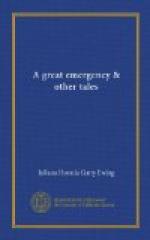“A canal’s nothing to a river,” said Mr. Rowe, “same as a river’s nothing to the sea,” and when Fred had some difficulty in keeping his hat on in the gusty street (mine was in use as a fruit-basket), and the barge-master said it was a “nice fresh morning,” I felt that life on Linnet Island would have been tame indeed compared to the hopes and fears of a career which depended on the winds and waves.
And when the boom went up the barge’s mast, and the tightly corded roll of dark canvas began to struggle for liberty, and writhe and flap with throttling noises above our heads, and when Mr. Rowe wrestled with it and the driver helped him, and Fred and I tried to, and were all but swept overboard in consequence, whilst the barge-master encouraged himself by strange and savage sounds—and when the sunshine caught our nut-brown sail just as she spread gallantly to the breeze, our excitement grew till we both cried in one breath,
“This is something like being at sea!”
CHAPTER XI.
MR. ROWE ON BARGE-WOMEN—THE RIVER—NINE ELMS—A MYSTERIOUS NOISE—ROUGH QUARTERS—A CHEAP SUPPER—JOHN’S BERTH—WE MAKE OUR ESCAPE—OUT INTO THE WORLD.
Mr. Rowe is quite right. A canal is nothing to a river.
There was a wide piece of water between us and one of the banks now, and other barges went by us, some sailing, some towing only, and two or three with women at the rudder, and children on the deck.
“I wouldn’t have my wife and fam’ly on board for something!” said Mr. Rowe grimly.
“Have you got a family, Mr. Rowe?” I inquired.
“Yes, sir,” said the barge-master. “I have, like other folk. But women and children’s best ashore.”
“Of course they are,” said I.
“If you was to turn over in your mind what they might be good for now,” he continued, with an unfathomable eye on the mistress of a passing canal-boat, “you’d say washing the decks and keeping the pots clean. And they don’t do it as well as a man—not by half.”
“They seem to steer pretty well,” said I.
“I’ve served in very different vessels to what I’m in now,” said Mr. Rowe, avoiding a reply, “and I may come as low as a monkey-barge and coal; but I’m blessed if ever I see myself walk on the towing-path and leave the missus in command on board.”
At this moment a barge came sailing alongside of us.
“Oh look!” cried Fred, “it’s got a white horse painted on the sail.”
“That’s a lime barge, sir,” said Mr. Rowe; “all lime barges is marked that way.”
She was homeward bound, and empty, and soon passed us, but we went at a pretty good pace ourselves. The wind kept favourable, a matter in which Fred and I took the deepest interest. We licked our fingers, and held them up to see which side got cooled by the breeze, and whenever this experiment convinced me that it was still behind us, I could not help running back to Fred to say with triumph, “The wind’s dead aft,” as if he knew nothing about it.




